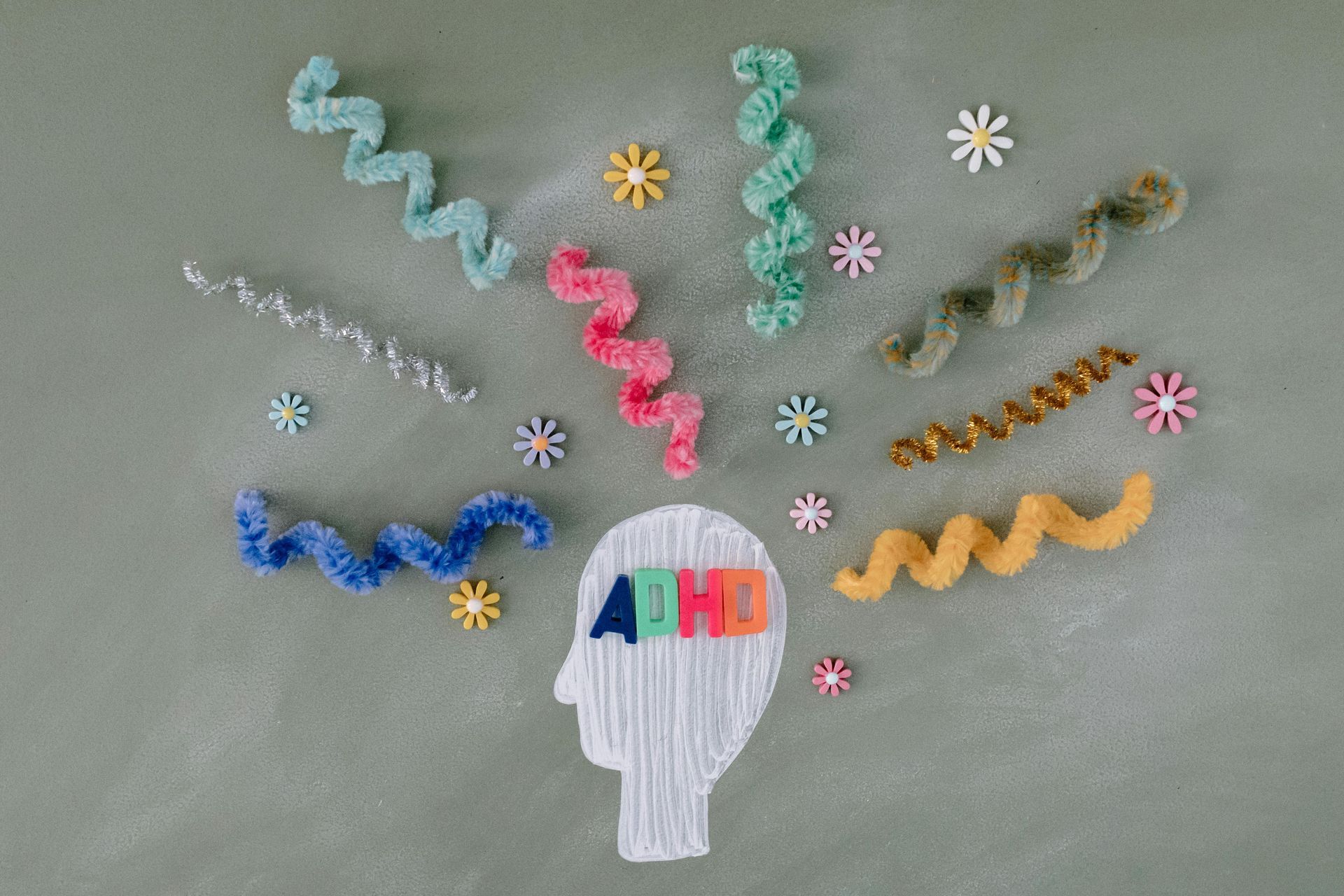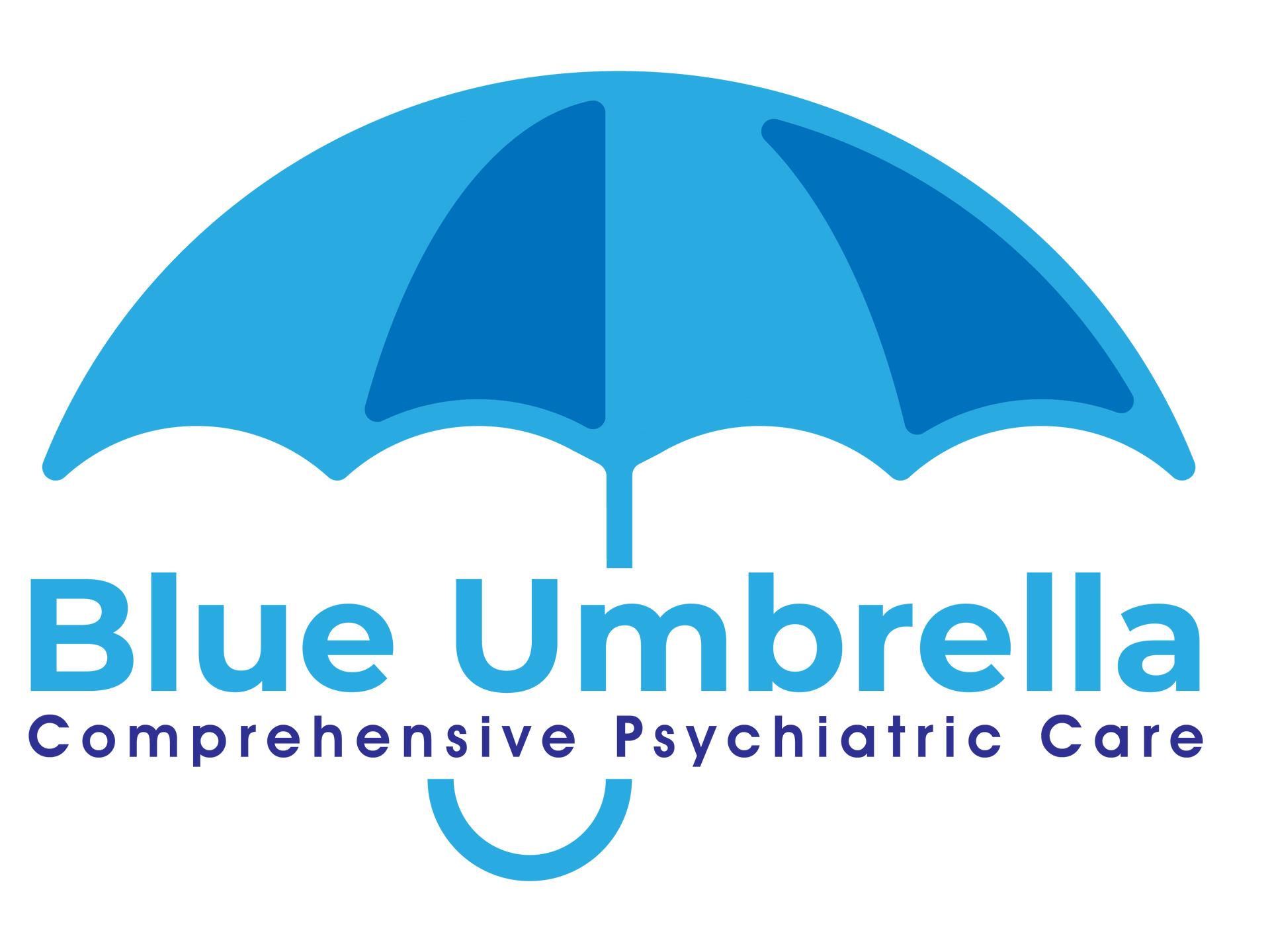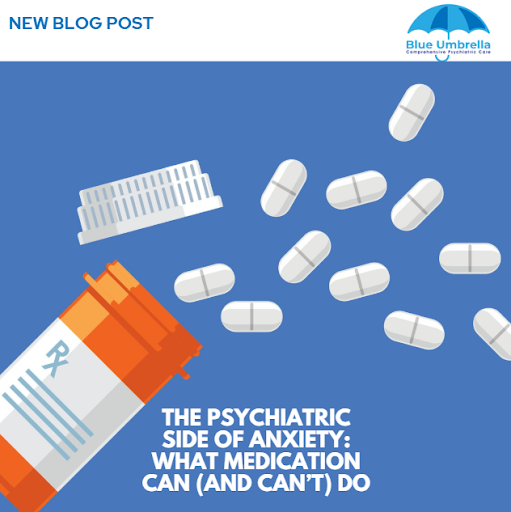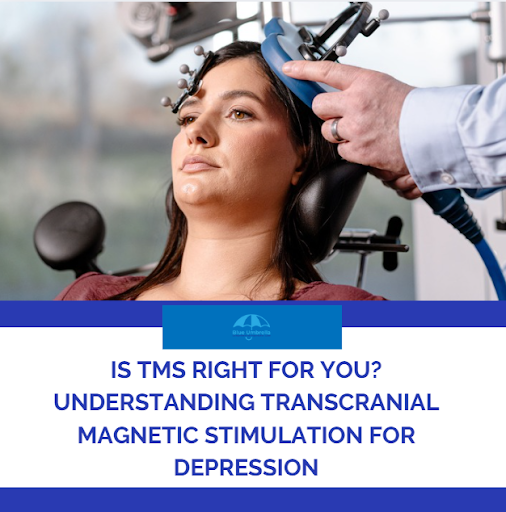HERE TO ANSWER YOUR QUESTIONS

For those living with treatment-resistant depression, it’s common to feel like you’ve tried everything — multiple medications, therapy, lifestyle changes — and still, the cloud won’t lift. At Blue Umbrella Psychiatry, we offer Spravato® (esketamine) as a powerful, FDA-approved treatment option when standard antidepressants haven’t provided relief. Spravato isn’t a first-line treatment — it’s for patients who have tried at least two other antidepressants without success. But for the right individuals, it can be life-changing. What Is Spravato®? Spravato® is a nasal spray form of esketamine, a medication derived from ketamine. Unlike traditional antidepressants that target serotonin or norepinephrine, esketamine acts on glutamate — a different brain chemical involved in mood regulation and neuroplasticity (the brain's ability to form new connections). Because of this unique mechanism, many patients begin to feel improvement within hours to days — not weeks. Who Is It For? Spravato® is approved for adults with: Treatment-resistant depression Major depressive disorder with suicidal thoughts or behaviors It’s typically used in combination with an oral antidepressant for best results. What to Expect During Treatment Spravato® must be administered in-office under supervision due to its potential side effects. At Blue Umbrella Psychiatry, our Breakthrough Center offers a calm, private treatment space designed for your safety and comfort. Here’s how it works: You self-administer the nasal spray in our clinic. You remain under observation for two hours afterward. Our staff monitors your blood pressure, vital signs, and response. You’ll need a ride home after each session. Starting Strong: Twice a Week for Four Weeks To maximize effectiveness, patients begin Spravato® treatment with an induction phase — typically twice-weekly sessions for the first four weeks. This schedule is designed to give your brain the best chance to respond and stabilize. After that, treatment usually shifts to once weekly or every other week, based on your progress and your provider’s recommendation. Is Spravato® Safe? Spravato® is well-studied and FDA-approved, but it isn’t right for everyone. Common side effects can include dizziness, dissociation, nausea, or increased blood pressure. That’s why it’s administered in a structured, supervised setting. Before starting, you’ll undergo a comprehensive evaluation to ensure it’s a safe and appropriate fit for your needs. Real Relief, Backed by Science Many of our patients who have felt stuck or hopeless with other medications report that Spravato® finally offers a shift — a sense of lightness, clarity, or energy they haven’t felt in years. Some say it’s the first treatment that made a noticeable difference. It’s not a magic fix, but it’s a significant step forward when other paths have been exhausted. Spravato® + Therapy: A Healing Combination At Blue Umbrella Psychiatry, we believe Spravato® is most powerful when paired with therapy. Medication can lift the fog — therapy helps you rebuild once you can see the road again. Our therapists work closely with psychiatric providers to support your healing, offering a whole-person approach to recovery. Is Spravato® Right for You? Let’s Talk If you’re feeling stuck and nothing else has helped, Spravato® may be worth exploring. You don’t have to go it alone — and you don’t have to keep trying the same things expecting different results.

When we think of depression, we often picture someone who can’t get out of bed, who cries constantly, or who’s visibly struggling. But depression doesn’t always look like what we expect. Many adults live with high-functioning depression — managing careers, parenting, and responsibilities on the outside, while quietly battling pain on the inside. At Blue Umbrella Psychiatry, we frequently see individuals who “have it all together” but feel empty, exhausted, or numb underneath. If this sounds like you or someone you love, you’re not alone — and there are ways to find balance, relief, and renewed purpose. What Is High-Functioning Depression? High-functioning depression isn’t a clinical diagnosis on its own — it often refers to Persistent Depressive Disorder (dysthymia) or Major Depressive Disorder that’s masked by productivity. People with high-functioning depression may keep up appearances, perform well at work, and fulfill social roles — all while feeling internally depleted. Common signs include: Constant low mood or emptiness Feeling tired or emotionally flat, even with enough sleep Difficulty enjoying things you used to love Irritability, guilt, or self-criticism Overworking or perfectionism to distract from inner distress Withdrawing emotionally, even while staying socially active “Everything is fine” on the outside, but “I’m not okay” inside This form of depression is especially tricky — because it can go unnoticed, even by the person experiencing it. Why It Often Gets Missed High-functioning adults are often praised for being dependable, driven, and strong. This can lead to pressure to hide vulnerability, push through symptoms, or dismiss your own suffering. You might tell yourself: "Other people have it worse." "I should be grateful." "I just need to work harder." But depression doesn’t care how successful you are or how busy your calendar is. If you’re feeling emotionally numb, disconnected, or constantly overwhelmed, it’s worth paying attention. The Impact of Ignoring High-Functioning Depression When untreated, high-functioning depression can gradually erode your quality of life. Over time, it can lead to: Burnout and chronic fatigue Relationship strain Poor concentration and memory Increased risk for anxiety or substance use Loss of meaning or joy Worse, people often delay seeking help because they don’t “look depressed.” That’s why compassionate, early support matters. How We Help at Blue Umbrella Psychiatry You don’t have to wait for a crisis to seek help. At Blue Umbrella Psychiatry, we provide psychiatric evaluations and personalized treatment plans for adults dealing with all types of depression — including the quiet kind. Our approach includes: Medication management, when appropriate, to restore mood stability Therapy to address emotional burnout, perfectionism, and core beliefs Lifestyle support, including sleep, nutrition, and stress reduction strategies Ongoing collaboration between psychiatry and therapy to ensure continuity of care We aim to create a space where you don’t have to pretend everything is fine — because healing starts with honesty and support. You're Not Broken — You're Human High-functioning depression is not a character flaw. It’s a real mental health condition that deserves real care. You’re allowed to have struggles, even if everything “looks fine.” You’re allowed to ask for help, even if others rely on you. Therapy and psychiatric support can help you reconnect with your feelings, rediscover joy, and manage your mental health in sustainable ways. Let’s Talk — You Don’t Have to Do It Alone If you’ve been carrying quiet sadness, chronic fatigue, or emotional numbness, we see you — and we’re here to help. At Blue Umbrella Psychiatry, our team offers compassionate, integrated care that goes beyond the diagnosis. Together, we’ll explore what you’re going through and create a plan that fits your life — so you can feel more like yourself again.

Understanding ADHD in Adults: Symptoms, Struggles, and Support When we think of ADHD, we often imagine hyperactive kids bouncing around classrooms. But Attention-Deficit/Hyperactivity Disorder doesn’t disappear with age — in fact, many adults live with undiagnosed or misdiagnosed ADHD for years, impacting their relationships, work, and self-esteem. At Blue Umbrella Psychiatry, we work with adults at all stages of life who are just beginning to recognize the signs of ADHD. Whether you’ve long suspected it or are newly exploring a diagnosis, you’re not alone — and there are effective, compassionate ways to find clarity and relief. What Does Adult ADHD Look Like? ADHD in adults can look very different than it does in children. Hyperactivity may shift into restlessness or inner tension. Challenges with focus, organization, and follow-through are often the biggest struggles. Common signs of ADHD in adults include: Difficulty focusing or completing tasks Forgetfulness and frequent distractions Trouble organizing, prioritizing, or managing time Impulsivity — interrupting, overspending, or difficulty pausing Chronic lateness or missed deadlines Feeling overwhelmed by everyday responsibilities Emotional reactivity or mood swings It’s not laziness or lack of willpower — ADHD is rooted in how the brain regulates attention and executive functioning. The Emotional Toll of Undiagnosed ADHD Many adults with ADHD carry years of frustration or shame. You may have been labeled as “careless,” “disorganized,” or “too much.” You might blame yourself for things that are actually neurologically based. Untreated ADHD can lead to: Anxiety and depression Low self-esteem Relationship difficulties Career instability Chronic stress or burnout That’s why understanding the root cause — and getting proper support — can be life-changing. Getting Diagnosed and Treated At Blue Umbrella Psychiatry, we offer comprehensive ADHD evaluations tailored to adults. Diagnosis involves clinical interviews, symptom assessments, and a clear look at how your challenges impact daily life. If you’re diagnosed, we create a treatment plan that may include: Medication management (like stimulants or non-stimulants) Therapy focused on executive function, self-worth, and life skills Practical tools for time management, organization, and focus Coordination with therapists for ongoing behavioral support Treatment is about more than symptom relief — it’s about helping you thrive in work, relationships, and self-confidence. Yes, ADHD Affects All Ages We see adults of all ages seeking answers. Some are college students or young professionals, struggling to stay on track. Others are parents overwhelmed by juggling it all. Still others are approaching retirement, only now connecting the dots of a lifetime of distraction or underachievement. ADHD doesn’t expire. And it’s never too late to understand yourself more fully. How Therapy Helps with ADHD In addition to psychiatric care, therapy can make a big difference for adults with ADHD. At Blue Umbrella Psychiatry, our therapists help patients: Build routines and coping strategies Challenge internalized shame or self-doubt Improve relationships and communication Set boundaries and realistic goals Therapy and medication often work best as a team, offering support from multiple angles. You Deserve Support — Let’s Talk If you recognize yourself in any of these symptoms, we invite you to explore what might be going on — and what’s possible with the right support. At Blue Umbrella Psychiatry, we provide both psychiatric treatment and therapy, working together to help you manage ADHD with clarity and compassion.

Whether you’re navigating anxiety, feeling stuck in a relationship, adjusting to a new life stage, or just craving a space to sort things out — therapy offers a powerful place to begin. Yet many people hesitate to start or return to therapy because they aren’t sure how it works or whether it will really help. At Blue Umbrella Psychiatry, we believe therapy is one of the most effective tools for improving mental health — and that it’s never too early (or too late) to begin. Whether you're a young adult finding your path, a parent juggling demands, or someone facing retirement or loss, therapy offers a tailored approach to support you through it all. What Is Therapy, Really? Therapy, or psychotherapy, is a collaborative process where you and a licensed therapist work together to understand your thoughts, feelings, and behaviors. It’s not just about “talking” — it’s about discovering new ways to cope, heal, and grow. At its best, therapy is: Supportive: Offering a non-judgmental space to express and explore Insightful: Helping you understand patterns and what drives them Practical: Teaching tools to manage stress, improve relationships, and make changes Why Start Therapy Now? Life doesn’t wait for the “perfect” time. Most people come to therapy when things feel overwhelming, confusing, or harder than usual. But therapy is just as powerful for building resilience and personal growth before you hit a crisis. Therapy may be right for you if: You're managing symptoms of anxiety, depression, or ADHD You're facing a major change — a breakup, job shift, or health diagnosis You're feeling disconnected from others or yourself You're tired of old patterns holding you back You simply want to know yourself better Therapy + Psychiatry: A Powerful Partnership At Blue Umbrella Psychiatry, we offer both therapy and psychiatric services — including medication management, Spravato®, TMS, and Ketamine treatments. When therapy and psychiatry are integrated, patients often experience better outcomes. Your therapist and psychiatric provider can collaborate (with your permission) to ensure a comprehensive approach to your care — whether you're starting with talk therapy, exploring medication, or both. What to Expect in Therapy Therapy is tailored to your needs. Some people need short-term support to get through a rough patch. Others may dive into deeper work over time. Sessions typically last 45–60 minutes and may focus on: Identifying goals Learning coping strategies Exploring emotions and relationships Building self-awareness and self-compassion At Blue Umbrella, our therapists bring warmth, clinical experience, and a calming presence — offering guidance without judgment. It’s OK to Come Back to Therapy, Too If you’ve had therapy in the past and stopped for any reason — burnout, finances, life getting in the way — know that it’s always OK to come back. Your needs may look different now, and therapy can meet you where you are. In fact, many of our patients return to therapy during new life phases: parenting teens, managing a career shift, preparing for retirement, or adjusting to grief. Therapy evolves as you do. Start Where You Are — We’re Here to Help Therapy isn’t about being “broken” or needing to be fixed. It’s about being human — and honoring that life is sometimes messy, beautiful, overwhelming, and uncertain all at once. If you’re curious about how therapy could help you, we invite you to connect with us at Blue Umbrella Psychiatry. We’re here to support you — wherever you are in your journey. 📞 Call us or visit blueumbrellapsychiatry.com to get started.

In today’s hyper-connected world, it’s nearly impossible to escape the glow of a screen. From constant notifications and endless scrolling to back-to-back video calls, our digital lives can quietly take a toll on our mental health. At Blue Umbrella Psychiatry, we’re seeing more and more patients struggling with tech-related symptoms—like increased anxiety, difficulty concentrating, disrupted sleep, and emotional burnout. While technology helps us stay informed and connected, overuse can overload the nervous system. Excess screen time—especially on social media—can increase feelings of comparison, overstimulation, and even loneliness. The more time we spend online, the less time we spend grounded in the present moment or tuned into our emotional needs. Why Your Brain Needs a Break Your brain was never designed for constant stimulation. Every time you check your phone or jump between apps, your brain shifts gears—triggering micro-stress responses that add up throughout the day. This can lead to difficulty sleeping, mood swings, mental fatigue, and trouble focusing. For people already managing anxiety or depression, screen overuse can intensify symptoms and make it harder to regulate emotions. That’s where a digital detox comes in—not as a punishment, but as a powerful act of self-care. At Blue Umbrella Psychiatry, we encourage patients to step back from screens intentionally, even in small ways, to give their minds the rest and reset they need. Mindful Ways to Start a Digital Detox A digital detox doesn’t have to be all-or-nothing. Start small and build sustainable habits that work for your lifestyle. Some strategies we recommend include: Tech-Free Mornings or Evenings: Try starting or ending your day without checking your phone for the first 30 minutes. Instead, use that time for stretching, journaling, or sitting quietly with your coffee. Create Screen-Free Zones: Make your bedroom or dining area a no-phone zone. This helps reinforce rest, connection, and presence in your most meaningful spaces. Limit Notifications: Turn off non-essential alerts so you're not constantly pulled into your device. Choose when you want to engage. Swap Scrolling for Soothing: Instead of reaching for your phone out of habit, try a mindful alternative—like a breathing exercise, nature walk, or reading a physical book. Track Your Use: Awareness is key. Use built-in screen time tools or apps to understand your habits and gently challenge yourself to reduce them. At Blue Umbrella Psychiatry, our therapists work with patients to identify the emotional patterns behind screen overuse. Whether it's a way to avoid difficult feelings, fill empty space, or self-soothe stress, therapy can help you build more mindful coping strategies that truly restore you. Let Blue Umbrella Psychiatry Help You Reconnect with What Matters If you’ve been feeling overwhelmed, scattered, or emotionally drained, a digital detox might be the reset your mind and body need. Our compassionate team can help you build a personalized plan that supports emotional balance—without relying on constant digital input. Through mindfulness tools, therapy sessions, and practical behavior changes, we’ll help you feel more present, calm, and in control. Call us at 954-341-5215 to schedule your consultation. At Blue Umbrella Psychiatry, we’re here to help you create habits that support—not sabotage—your mental health. Let this summer be your season of reconnection.









